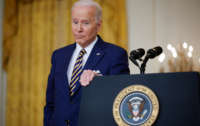
President Joe Biden dodged a question about his campaign promise to cancel up to $10,000 in student debt at a press conference on Wednesday, frustrating debt activists and borrowers who have been begging for relief.
A reporter asked the president a series of two questions toward the end of the press conference. “I have two really simple questions, I promise. You campaigned on canceling $10,000 in student loans,” the reporter said. “Do you still plan to do so and when?” The reporter then asked a question about the Electoral Count Act.
“I’m happy to speak out,” the president responded. But he only addressed the second question, talking about reaching out to Republicans on election issues and negotiating across the aisle. He then left the podium, ending the conference.
Debt activists have criticized Biden for “blatantly” ignoring the question. “Biden may have dodged a question today, but he won’t be able to ignore 45 million student loan borrowers if he attempts to turn payments back on in May,” said Braxton Brewington, press secretary of activist group the Debt Collective.
“The president’s ignoring of a valid question on student debt and his failure to keep a campaign promise is unfortunately reflective of this administration’s failure – whether through incompetence or malice – to address the costly burden of student loans,” Brewington continued. “$1.8 trillion of crushing student debt is a major policy failure that Biden can fix with the stroke of a pen.”
It’s unclear why the president has thus far refused to follow up on his promise to relieve student debt. Although Biden promised on the campaign trail to cancel up to $10,000 of student loans per borrower, his tone on the subject changed drastically after he took office.
In early April of last year, White House Chief of Staff Ron Klain told Politico that Biden had asked the Education Department to prepare a memo assessing the president’s legal authority to cancel student debt through the executive branch. Klain said that the memo would be ready in the coming weeks, but the memo never materialized.
For months afterward, White House Press Secretary Jen Psaki maintained that the administration didn’t have any news on the memo. But in November, debt activists uncovered the document via a Freedom of Information Act request. It was dated April 8.
Further, the contents of the memo were redacted, leading activists to speculate that the agency found that Biden has the legal authority to cancel student debt with “a stroke of a pen,” like many legal experts have emphasized.
“The Debt Collective activists developed a theory: that the lawyers at the Department of Education had already written their memo, that they had advised Biden that he did have the authority to cancel debt, and that the Administration was keeping the memo quiet because they didn’t like its conclusions,” wrote The New Yorker at the time. “But this was mere speculation.”
In December, Biden further sparked the ire of progressives and debt activists when Psaki announced that his administration would not be extending the student loan repayment pause, which was scheduled to conclude at the end of January. She went on to say that restarting loans was a “high priority for the administration,” a declaration that many debt activists viewed as callous.
After Psaki’s statement sparked outrage, the White House reneged and extended the student loan payment pause for another 90 days; payments are now due to restart on May 1. Advocates for debt relief celebrated the announcement, but emphasized that it isn’t enough.
“For at least a few more months, struggling families will be able to keep tens of billions of dollars in their pockets — costly student loan payments that the federal government continues to prove it doesn’t need to function,” Brewington said. “Next, the Biden administration should permanently relieve this financial burden on families and the economy by using his executive authority to eliminate all federal student debt.”
Research has found that when student loan payments restart, borrowers will collectively lose out on $85 billion annually. This disproportionately affects Black borrowers, who typically hold a higher debt burden than their white peers.
For many borrowers, student loans are a huge financial burden that can follow them for decades. Some borrowers have reported their debt blowing up to multiple times the original loan amount, even if they make payments on time.
This post was originally published on Latest – Truthout.